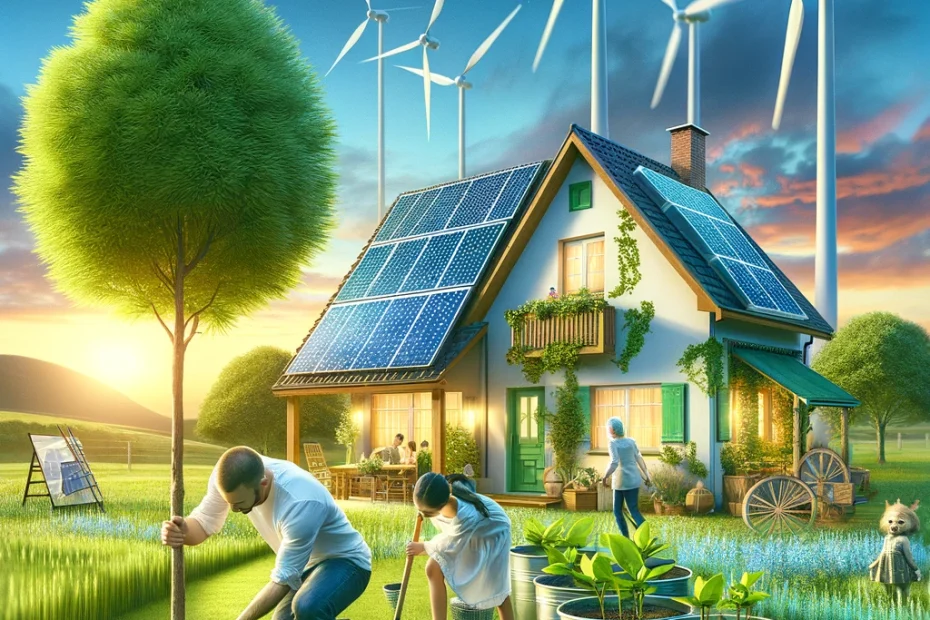Introduction In today’s environmentally conscious world, reducing your carbon footprint is more important than ever. As individuals strive for a greener planet, the focus on sustainable living practices has intensified. One of the most impactful ways to contribute to this global effort is through the adoption of renewable energy in our daily lives. This article will explore various aspects of green living, specifically how integrating renewable energy sources can significantly diminish our environmental impact.
Green Living: The Foundation of a Sustainable Future Green living encompasses a lifestyle that attempts to reduce an individual’s or society’s use of the Earth’s natural resources and personal resources. It’s about making conscious choices that are beneficial to the environment, the economy, and society as a whole.
Understanding Your Carbon Footprint Your carbon footprint measures how much carbon dioxide (CO2) emissions you are responsible for, directly or indirectly. It is a crucial indicator of your impact on the environment, highlighting the importance of transitioning to renewable energy sources.
The Role of Renewable Energy in Reducing Carbon Emissions Renewable energy comes from natural sources that are constantly replenished, such as sunlight, wind, rain, tides, waves, and geothermal heat. By harnessing these sources, we can significantly reduce our reliance on fossil fuels, thereby lowering our carbon emissions.
Solar Power: A Bright Idea for Green Living Solar energy, harnessed through photovoltaic panels, is one of the most popular and accessible forms of renewable energy. It can be used for various applications, from powering homes to heating water, offering a clean, abundant, and sustainable energy source.
Wind Energy: Harnessing the Power of the Breeze Wind energy is generated by converting wind currents into electricity using wind turbines. It’s a clean, efficient, and increasingly affordable way to reduce our carbon footprint and move towards a more sustainable energy system.
Hydropower: The Strength of Flowing Water Hydropower uses the energy of flowing water to generate electricity. It’s one of the oldest and most established forms of renewable energy, contributing significantly to reducing carbon emissions worldwide.
Geothermal Energy: Tapping into Earth’s Heat Geothermal energy harnesses the Earth’s natural heat from below the surface to generate electricity and provide heating. This reliable and sustainable energy source has a low environmental footprint and can significantly reduce carbon emissions.
Biomass Energy: Organic Materials as Renewable Resources Biomass energy is produced from organic materials, such as plant and animal waste. It can be a sustainable way to produce energy, provided it is managed responsibly, reducing waste and lowering carbon emissions.
Renewable Energy at Home: Practical Tips and Tricks Incorporating renewable energy into your home doesn’t have to be a daunting task. Simple steps like installing solar panels, using energy-efficient appliances, and exploring green energy providers can make a significant difference.
The Economic Benefits of Adopting Renewable Energy Besides being environmentally friendly, renewable energy can also be economically beneficial. It can reduce energy bills, create jobs in green energy sectors, and decrease dependency on imported fuels.
Challenges and Considerations in Transitioning to Renewable Energy While the shift towards renewable energy is crucial for our planet, it comes with its set of challenges. These include the initial investment, the need for technological advancement, and ensuring a stable energy supply.
How Governments and Policies Can Support Renewable Energy Government policies play a crucial role in promoting renewable energy. Incentives, subsidies, and regulations can encourage both individuals and businesses to make the switch to greener energy sources.
The Future of Renewable Energy: Innovations and Trends As technology advances, the future of renewable energy looks promising. Innovations in storage, efficiency, and accessibility of renewable sources are expected to drive the green revolution forward.
Renewable Energy and Education: Raising Awareness for Sustainable Living Education is key to promoting renewable energy adoption. Raising awareness about the benefits of green living and renewable energy can inspire more people to make environmentally friendly choices.
Green Living: How to Reduce Your Carbon Footprint with Renewable Energy Adopting renewable energy is one of the most effective ways to reduce your carbon footprint and contribute to a sustainable future. By making conscious choices and advocating for green policies, we can all play a part in protecting our planet.
FAQs
What is renewable energy and why is it important? Renewable energy comes from natural sources that are continually replenished. It’s important because it reduces our reliance on fossil fuels, decreases carbon emissions, and helps combat climate change.
How can I reduce my carbon footprint with renewable energy? You can reduce your carbon footprint by incorporating renewable energy sources, such as solar or wind power, into your daily life. This can include installing solar panels, using energy-efficient appliances, or choosing green energy providers.
What are the economic benefits of using renewable energy? Renewable energy can lower energy bills, create jobs, and reduce dependency on imported fuels. It represents a sustainable investment in our planet’s future.
Can renewable energy fully replace fossil fuels? While renewable energy has the potential to significantly reduce reliance on fossil fuels, a complete transition requires advancements in technology, infrastructure, and policy support.
How can I support the transition to renewable energy? Supporting the transition to renewable energy can be done through personal choices, such as using renewable energy sources at home, and advocating for policies and initiatives that promote green energy.
Conclusion Adopting renewable energy is a vital step towards achieving a sustainable future and reducing our carbon footprint. By embracing green living practices and supporting renewable energy, we can help protect our planet for future generations. The journey towards a greener world is a collective effort, and every small step counts.
